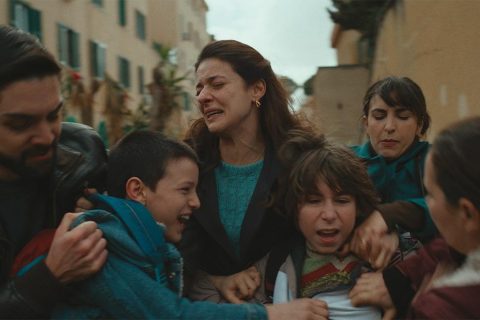It’s important to distinguish between skinheads and boneheads.
Traditional skinheads are sharply dressed, usually into old ska and reggae records, and are generally lovely people who embody the culture’s working-class, inclusive roots. Boneheads, on the other hand, are crude, racist culture vultures who appropriate the skinhead look to promote ultra-racist and nationalist attitudes — all while creating some of the worst music ever recorded.
Luigi (Francesco Gheghi), the young protagonist of Francesco Costabile’s new domestic thriller Familia (2024), is a bonehead. He lives in Rome with his brother Alessandro (Marco Cicalese) and mother Licia (Barbara Ronchi), long separated from their abusive, criminal father Franco (Francesco Di Leva). Luigi engages in typical bonehead behaviour, like hanging out with fascist Andrew Tate lookalikes, and eventually ends up in prison after stabbing a man during a scuffle. Upon his release, Franco reenters his life, forcing Luigi to confront his past and the cycle of violence he’s caught in.
Due to a time jump from an extended childhood introduction to ten years later, Familia’s first hour feels uneven. Perhaps because it’s based on a true story, the plot comes across as episodic—one event leading to another in a somewhat disjointed fashion—leaving us to wonder what the central focus is. Is it about a young man falling prey to fascist gangs, or a father who won’t leave his ex-wife and children alone? It turns out to be both, and the film finds more rhythm and focus in its second half as these two storylines converge.
Familia succeeds more as a commentary on the cyclical nature of generational violence associated with toxic masculinity than as a fascist’s redemption story. The film doesn’t attempt to explain why young people get mixed up with ultra-fascist gangs, perhaps because the subject has already been extensively covered in Italian media. In Luigi’s case, his involvement with the gang feels almost inevitable — a pattern observed countless times among young men from abusive homes. (The group in the film is dubbed Decima Mas, with a leader who bears a passing resemblance to the aforementioned Tate.)
There’s also a notable absence of redemption regarding Luigi’s flirtation with fascism, which lends the character a more realistic and nuanced quality. Those expecting a tidy mea culpa won’t find it here; instead, Luigi is briefly drawn back into the fold later on. Costabile is more interested in exploring the irony of Luigi’s situation: he longs to be “good” — a good boyfriend, son, and brother — but in his world, being good might mean committing terrible acts to protect his family.
Luigi is a complex character; Gheghi captures the intensity and vulnerability required to portray a young man aware of his capacity for violence — not just in the outside world with his fascist friends, but also against women. This inner conflict surfaces in a heartbreaking moment when he tells the girl he loves, before going to jail, “I don’t want you to end up like my mom.” It’s a painful admission that he fears he might be incapable of a healthy relationship with a woman if he doesn’t confront his inner demons.
One of the film’s strongest scenes revisits this theme of compulsive violence. After his release from jail, Luigi sees Giulia at a carnival with a new man. He follows them onto the bumper car ride, systematically crashes into their car, and doesn’t relent until she silently acknowledges that they’re getting back together.
Strong performances hold Familia together. Francesco Di Leva is terrifying as Franco, a sociopath who can switch from charming and paternal to threatening in an instant. He brings to mind Bruce Willis’s character in the criminally underrated film Mortal Thoughts (Alan Rudolph, 1991)—a man who is an abusive jerk 90 percent of the time, but whose occasional charm makes him difficult to leave. Barbara Ronchi is also excellent, sinking deeply into her role as an exhausted, abused wife.
As the film progresses, Franco’s relentless presence forces a haunting question: How do you deal with a monster in your family when even the police cannot help? Each character’s life has been shattered by Franco, and without help or protection from authorities, they know they won’t have peace until he’s out of their lives for good. It’s a chilling and realistic dynamic that speaks not only to the issue of domestic violence in Italy but worldwide, giving voice to countless women and children failed by the system — driven so close to breaking point that they might have to become the very thing they despise to survive.
Editor-at-large Jared loves movies and lives with Kiki in Berlin.





